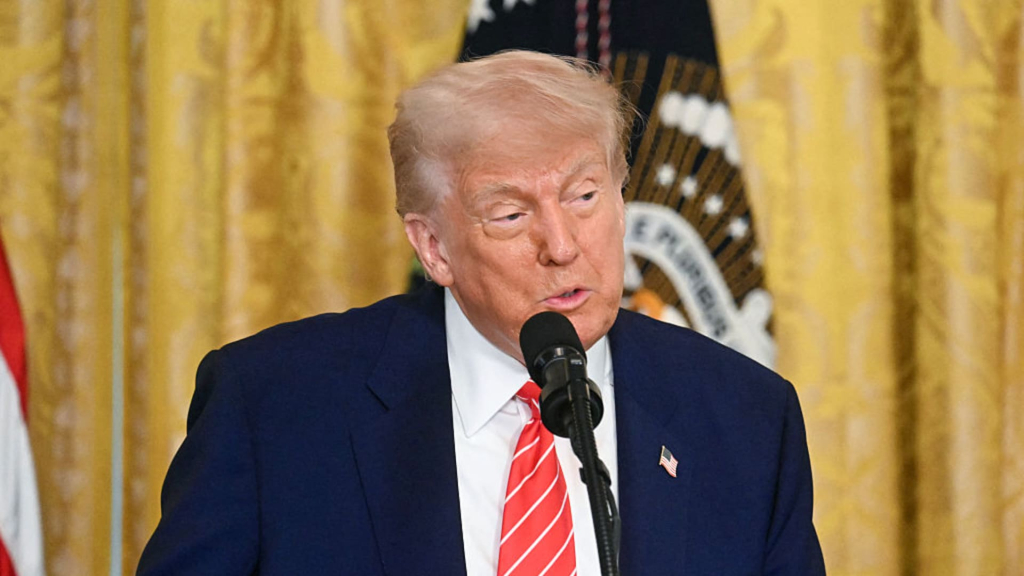On Monday, President Donald Trump is set to reinstate a contentious policy designed to reduce prescription drug prices by linking the costs paid by the government to those found in other countries with lower prices, according to officials at the White House.
One official stated, “For too long, foreign nations have been able to free ride off of the American people, and American patients forced to pay for too much for prescription drugs,” during a briefing for reporters.
The president will sign an executive order that outlines various measures to relaunch what is termed the “most favored nation” policy.
While details regarding the specific medications affected remain undisclosed, White House officials indicated that this announcement would have a broader scope compared to a similar initiative Trump attempted during his initial term, which was limited to Medicare Part B drugs.
The potential effectiveness of the policy in reducing patient costs remains uncertain. In a social media post, Trump asserted that drug prices could drop by “59%, PLUS!”
This executive order instructs the Office of the U.S. Trade Representative and the Department of Commerce to address “unreasonable and discriminatory policies” in foreign nations that allegedly suppress drug prices. Furthermore, it mandates the Secretary of the Department of Health and Human Services to promote “most favored nation prices.”
Within a month, the Secretary is expected to establish clear targets for price reductions across all U.S. markets, officials noted.
This latest move is part of Trump’s ongoing efforts to manage skyrocketing prescription drug prices in the U.S., where costs are reported to be two to three times higher than in other developed nations, with some medications costing up to ten times more than in certain countries, according to the Rand Corporation.
The policy poses a significant challenge to the pharmaceutical industry, which is already preparing for upcoming tariffs on prescription medications. Drug manufacturers argue that the “most favored nation” policy could diminish their profits and ultimately hinder their capacity to innovate and develop new treatments.
In contrast, the policy could potentially benefit patients by making prescription drugs more affordable, a pressing concern for many in the U.S. Approximately three-quarters of American adults consider the cost of medications to be unmanageable, as revealed by a 2022 KFF poll.
The pharmaceutical industry has previously lobbied against similar proposals made by Trump during his first term. While he sought to advance this policy in the closing months of that term, a federal judge intervened, halting the effort after a lawsuit from drug manufacturers. The Biden administration subsequently reversed that policy.
Initially, White House officials urged congressional Republicans to incorporate a “most favored nation” clause in a major reconciliation bill slated for passage in the coming months. However, the measure, which specifically targeted Medicaid drug costs, faced opposition from several GOP members.
PhRMA, the largest trade organization for the pharmaceutical industry, estimated that Trump’s Medicaid proposal could lead to losses of up to $1 trillion for drugmakers over the next decade.
Critics among health policy experts have expressed skepticism regarding the effectiveness of a “most favored nation” drug pricing policy. For instance, scholars from USC indicated that the initiative could not change the fundamental economics of the global pharmaceutical market, where 70% of industry profits originate from the U.S.
“Facing a choice between significant reductions in U.S. pricing or the withdrawal from less profitable international markets, we may see many companies exit overseas markets swiftly,” the experts stated in an April report.
As a result, they warned that American patients might not see price reductions, drug manufacturers could experience decreased profits, and future patients may face limited innovations.
Other commentators have suggested that further legal challenges from the pharmaceutical sector could impede the implementation of the policy.
Nevertheless, the administration has additional mechanisms to influence drug prices: Medicare’s new ability to negotiate prices, a significant component of the Inflation Reduction Act, which allows Medicare to negotiate certain drug costs with manufacturers for the first time.
Recently, Trump proposed alterations to this negotiation policy, adjustments that drugmakers have long advocated. Lawmakers from both parties may consider these changes favorably, as they propose to redefine rules that differentiate between small-molecule drugs and biologic medicines.
Last week, Trump announced plans to impose tariffs on imported medicines within the next two weeks, intended to bolster domestic drug production.
Major pharmaceutical companies, including Eli Lilly and Pfizer, are resisting these anticipated tariffs. Some firms have also questioned the necessity of such measures, given their ongoing investment in new U.S. manufacturing and research initiatives since Trump’s administration began.
Despite industry pushback, Trump recently reaffirmed his commitment to strengthening domestic drug manufacturing by signing an executive order that facilitates the establishment of new production facilities.
Essentially, even with challenges from pharmaceutical firms regarding the executive order, the administration retains options—including Medicare negotiations—to drive down drug prices.


























